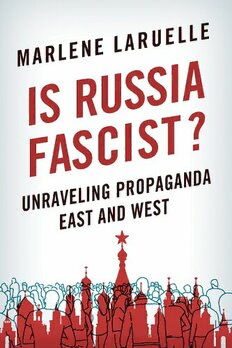
Is Russia Fascist?: Unraveling Propaganda East and West PDF
Preview Is Russia Fascist?: Unraveling Propaganda East and West
IS RUS SIA FASCIST? IS RUSS IA FASCIST? Unraveling Propaganda East and West Marlene Laruelle CORNELL UNIVERSITY PRESS ITHACA AND LONDON Copyright © 2021 by Cornell University All rights reserved. Except for brief quotations in a review, this book, or parts thereof, must not be reproduced in any form without permission in writing from the publisher. For information, address Cornell University Press, Sage House, 512 East State Street, Ithaca, New York 14850. Visit our website at cornellpress .c ornell. e du. First published 2021 by Cornell University Press Library of Congress Cataloging- in- Publication Data Names: Laruelle, Marlène, author. Title: Is Rus sia fascist? : unraveling propaganda east and west / Marlene Laruelle. Description: Ithaca [New York] : Cornell University Press, 2021. | Includes bibliographical references and index. Identifiers: LCCN 2020022432 (print) | LCCN 2020022433 (ebook) | ISBN 9781501754135 (hardback) | ISBN 9781501754142 (epub) | ISBN 9781501754159 (pdf) Subjects: LCSH: Fascism— Russia (Federation) | Po liti cal culture— Russia (Federation) | Ideology— Russia (Federation) | Rus sia (Federation)— Foreign public opinion. | Rus sia (Federation)— Politics and government—1991– | Russ ia (Federation)—F oreign relations—E urope. | Europe—F oreign relations— Russia (Federation) Classification: LCC DK510.763 .L374 2021 (print) | LCC DK510.763 (ebook) | DDC 320.53/30947— dc23 LC rec ord available at https:// lccn . loc . gov / 2020022432 LC ebook rec ord available at https:// lccn . loc . gov / 2020022433 Contents Acknowl edgments vii Introduction: Rus sia and the Symbolic Landscape of Fascism 1 1. Rus sia’s “Fascism” or “Illiberalism”? 10 2. The Soviet Legacy in Thinking about Fascism 28 3. Antifascism as the Renewed Social Consensus under Putin 43 4. International Memory Wars: Equating the Soviet Union with Nazism 62 5. The Putin Regime’s Ideological Plurality 84 6. Rus sia’s Fascist Thinkers and Doers 100 7. Rus sia’s Honeymoon with the Eu ro pean Far Right 121 8. Why the Rus sian Regime Is Not Fascist 138 Conclusion: Rus sia’s Memory and the F uture of Eu rope 157 Notes 167 Bibliography 211 Index 251 Acknowle dgments I owe a special debt of gratitude to the former director of George Washington Uni- versity’s Institute for Eu ro pean, Rus sian, and Eurasian Studies (IERES), Peter Rollberg, who was the first to push me to look at “fascism” as a semantic space, and to the w hole institute for being such a collegial place in supporting its scholars’ research interests. I could not have completed this book without the incredible intellectual input I received on a first draft of the manuscript during an IERES/PONARS “book in- cubator” workshop and from presenting a summarizing chapter at the DC Area Postcommunist Politics Social Science Workshop. Paul Goode, Henry Hale, Stephen Hanson, Charles King, Maria Mälksoo, Robert Otto, Peter Rollberg, Anton Shekhovtsov, Kathleen Smith, Gerard Toal, Nina Tumarkin, Andreas Umland, Aleksandr Verkhovsky, and Sufian Zhemukhov all helped me to recon- sider and reshape the entire manuscript, including the main argument. I also extend my gratitude to Roger M. Haydon at Cornell University Press and the two reviewers who provided substantive guidance on the manuscript. Dylan Royce and John Chrobak assisted me in finalizing this research and polished the bibliography, and Ellen Powell, Emily Herring, Ann Robertson, and Caleb Crawford provided much-n eeded editing assistance. Last but not least, my sincerest gratitude and tribute go to my husband, who offered me emotional and intellectual sustenance during the writing pro cess, showing unwavering faith in the proj ect and guiding me through many of the book’s conclusions. vii Introduction RUS SIA AND THE SYMBOLIC LANDSCAPE OF FASCISM In January 2020, the commemoration of the seventy-fi fth anniversary of the lib- eration of the Auschwitz camp was unexpectedly overshadowed by memory wars between Rus sia, Poland, and Ukraine over the interpretation of the Second World War. President Zelensky sided with the Polish interpretation of the war’s ori- gins and supported the parallel between Nazism and communism, stating, “Poland and the Polish p eople w ere the first to feel the collusion of totalitarian regimes. This resulted in the outbreak of the Second World War and allowed the Nazis to launch the deadly Holocaust.”1 This declaration deeply shocked the Rus sian public; Putin and the whole po liti cal establishment virulently denounced not only the idea of paralleling communism with Nazism under the “totalitarianism” label but also the attempt to make Rus sia and its pre de ces sor, the Soviet Union, responsible— even indirectly— for the Holocaust. A few weeks before t hese clashes, in an hour-l ong history lecture, the Russ ian president, blaming the Polish minister of foreign affairs in 1939, Józef Lipski (describing him as “a scumbag and an anti-S emitic pig”), accused Poland of hav- ing colluded with Hitler, supported the deportation of Jews, and therefore con- tributed to the outbreak of the Second World War.2 At the Victory Parade of May 9, 2019, Putin has already warned: “ Today, we see how a number of countries are deliberately distorting war events, and how t hose who, forgetting honor and h uman dignity, served the Nazis, are now being glorified, and how shamelessly they lie to their children and betray their ancestors. Our sacred duty is to protect the real heroes.”3 In June 2020, a lengthy article was published in National Interest whereby 1
